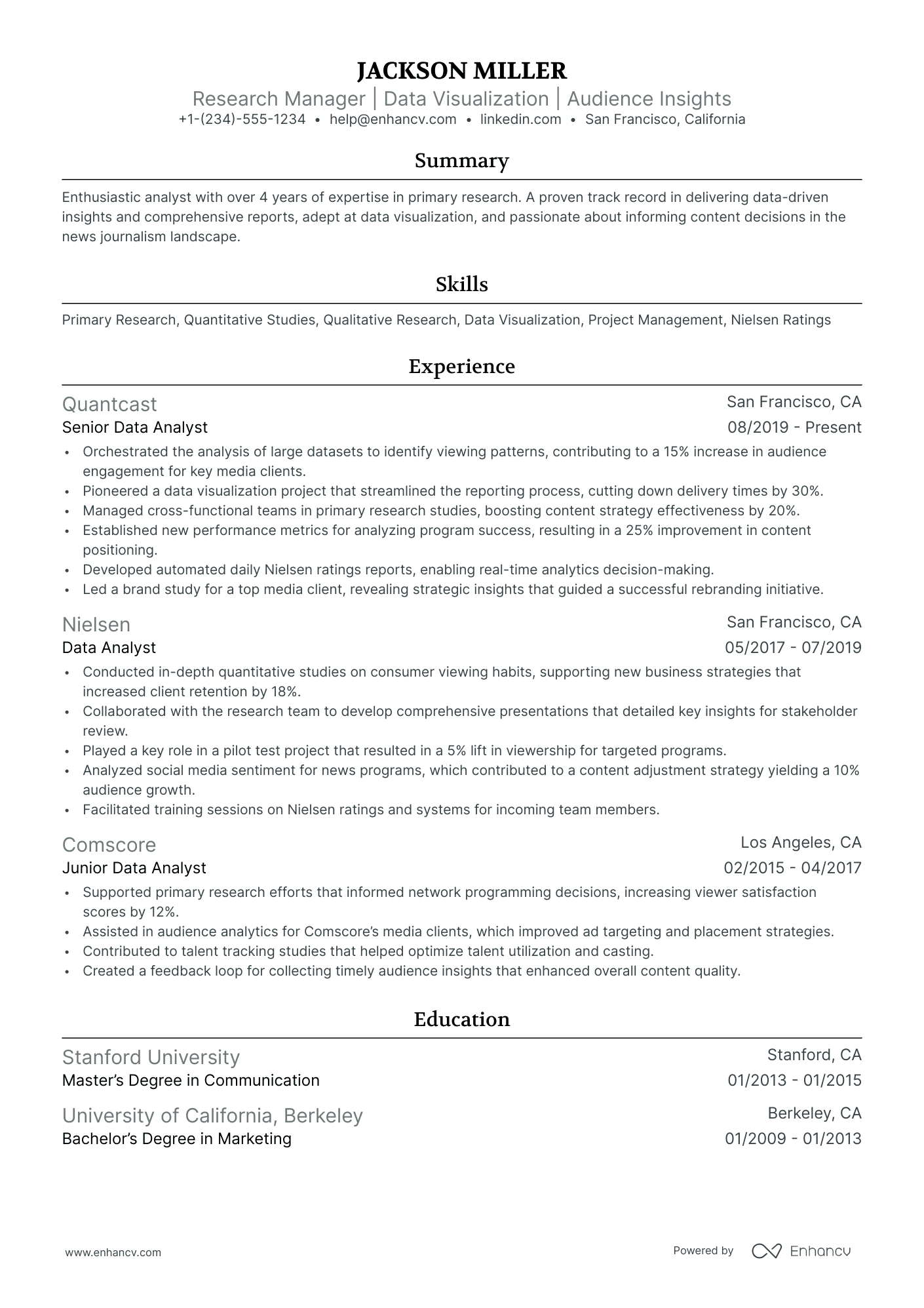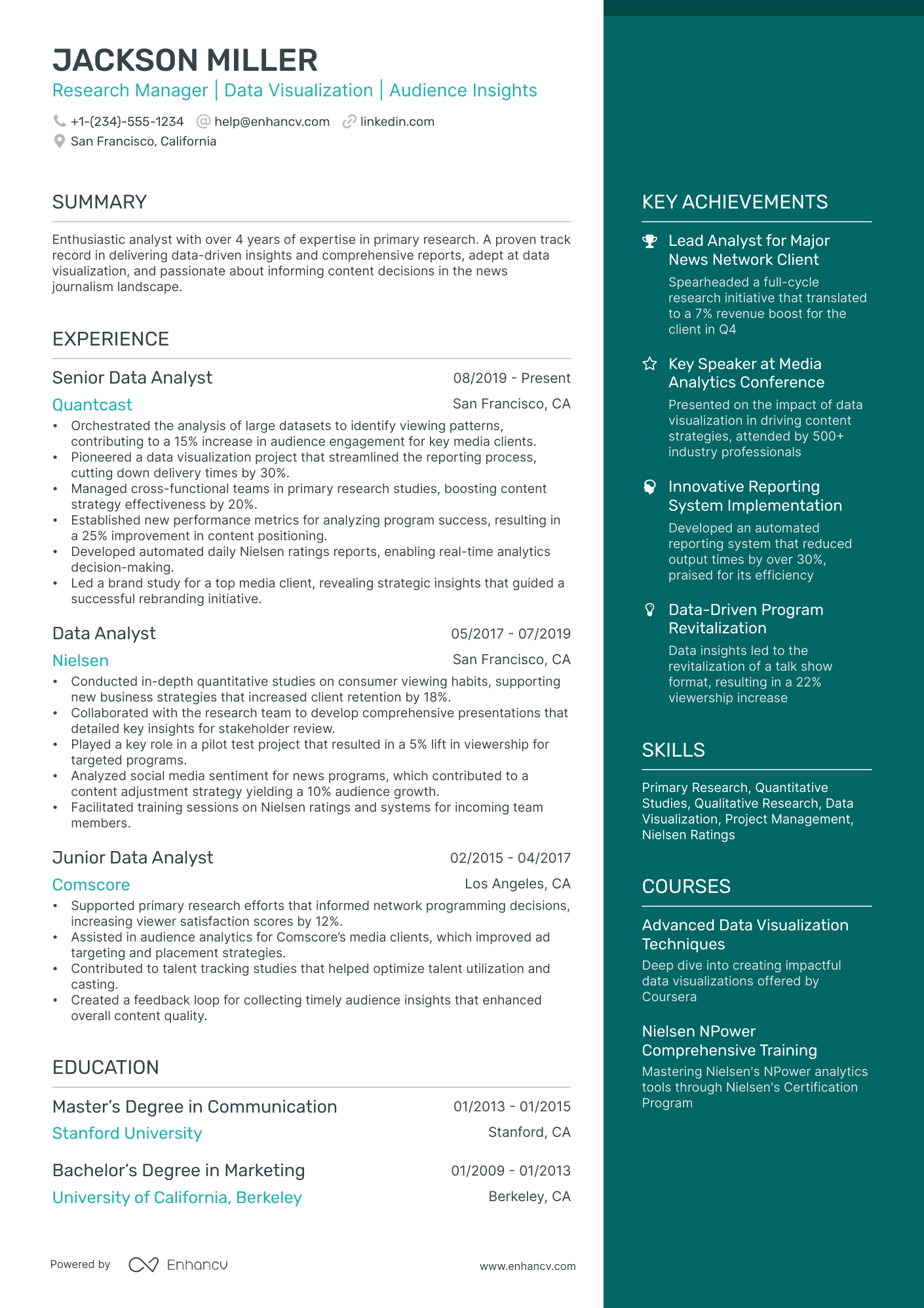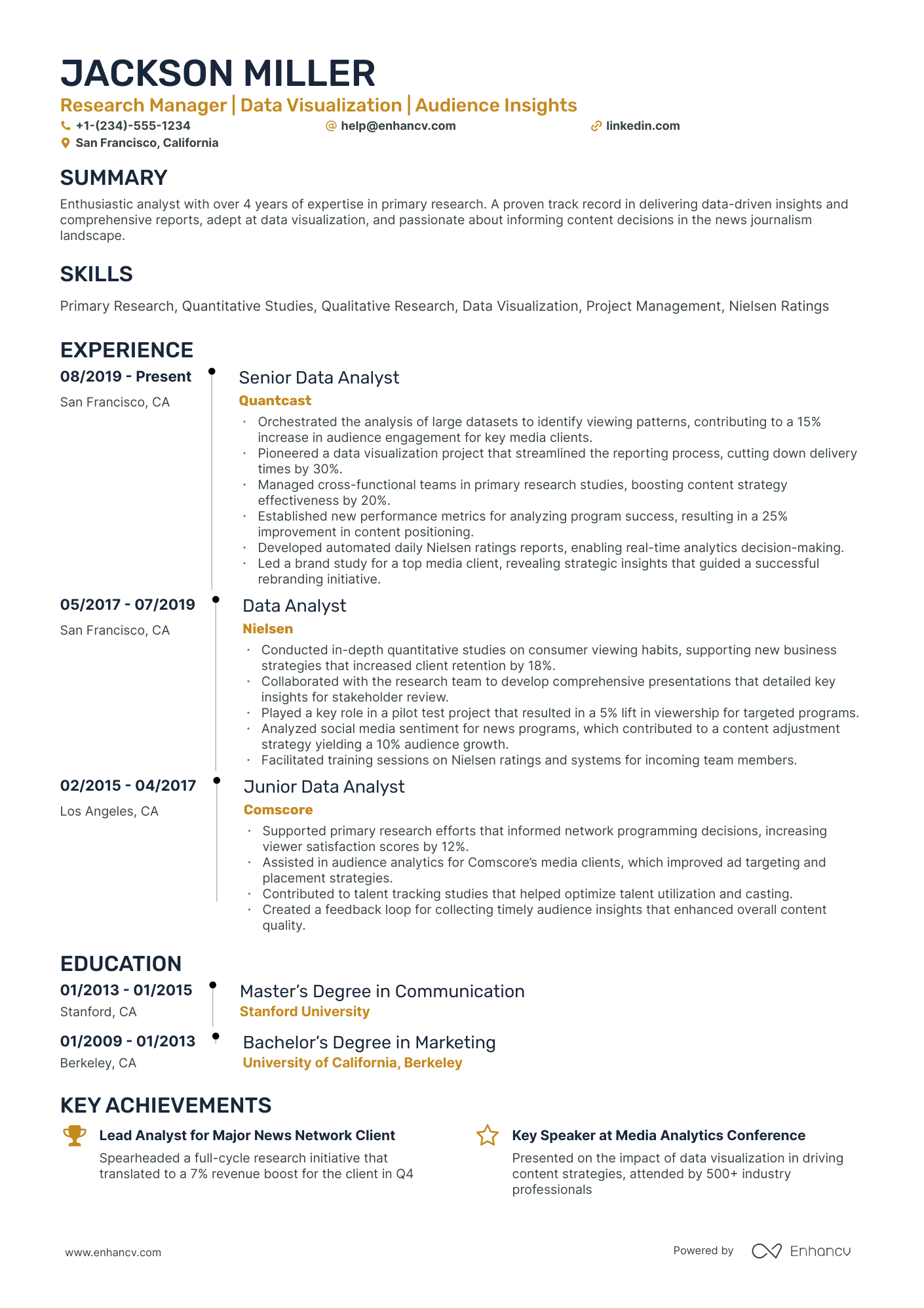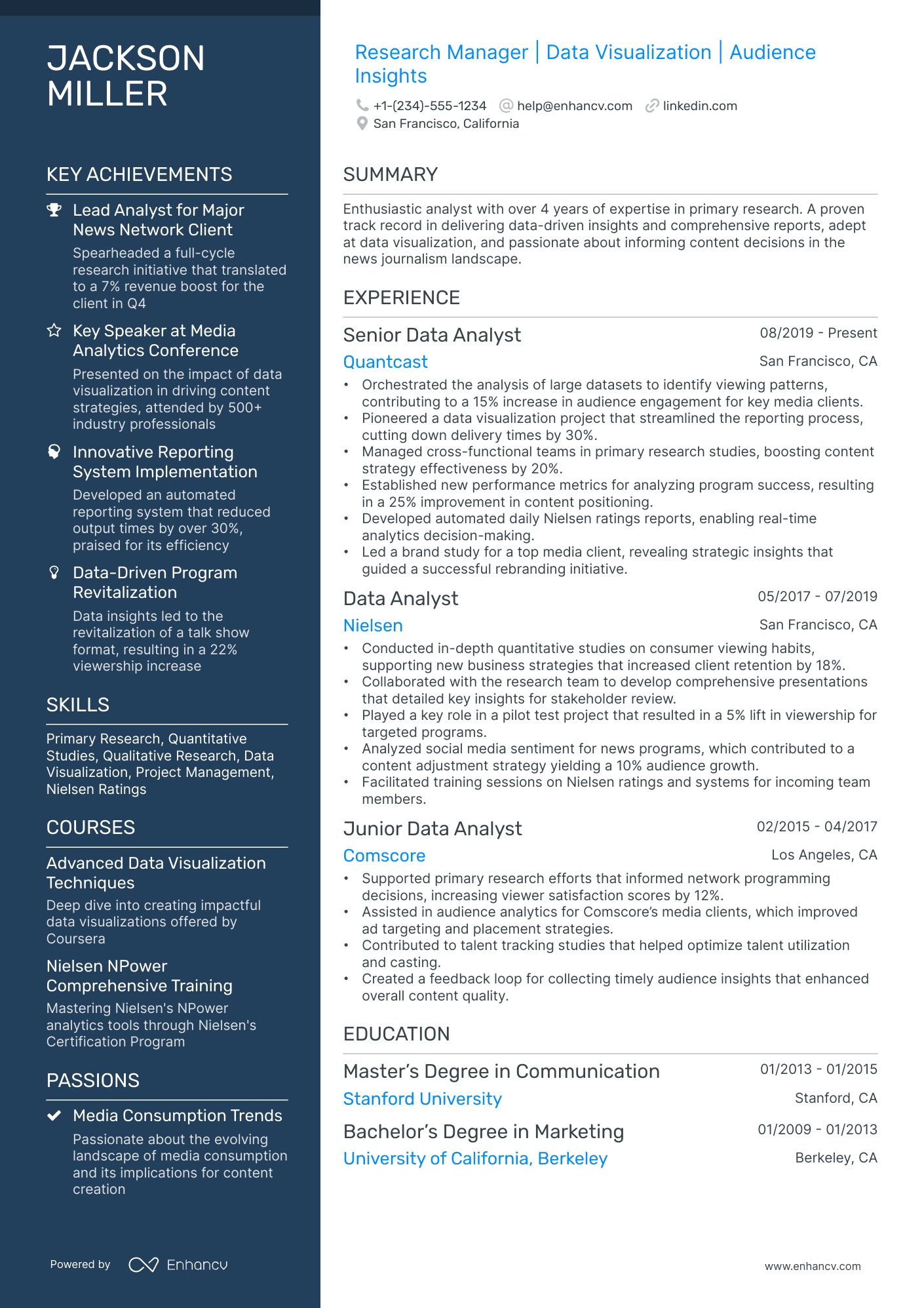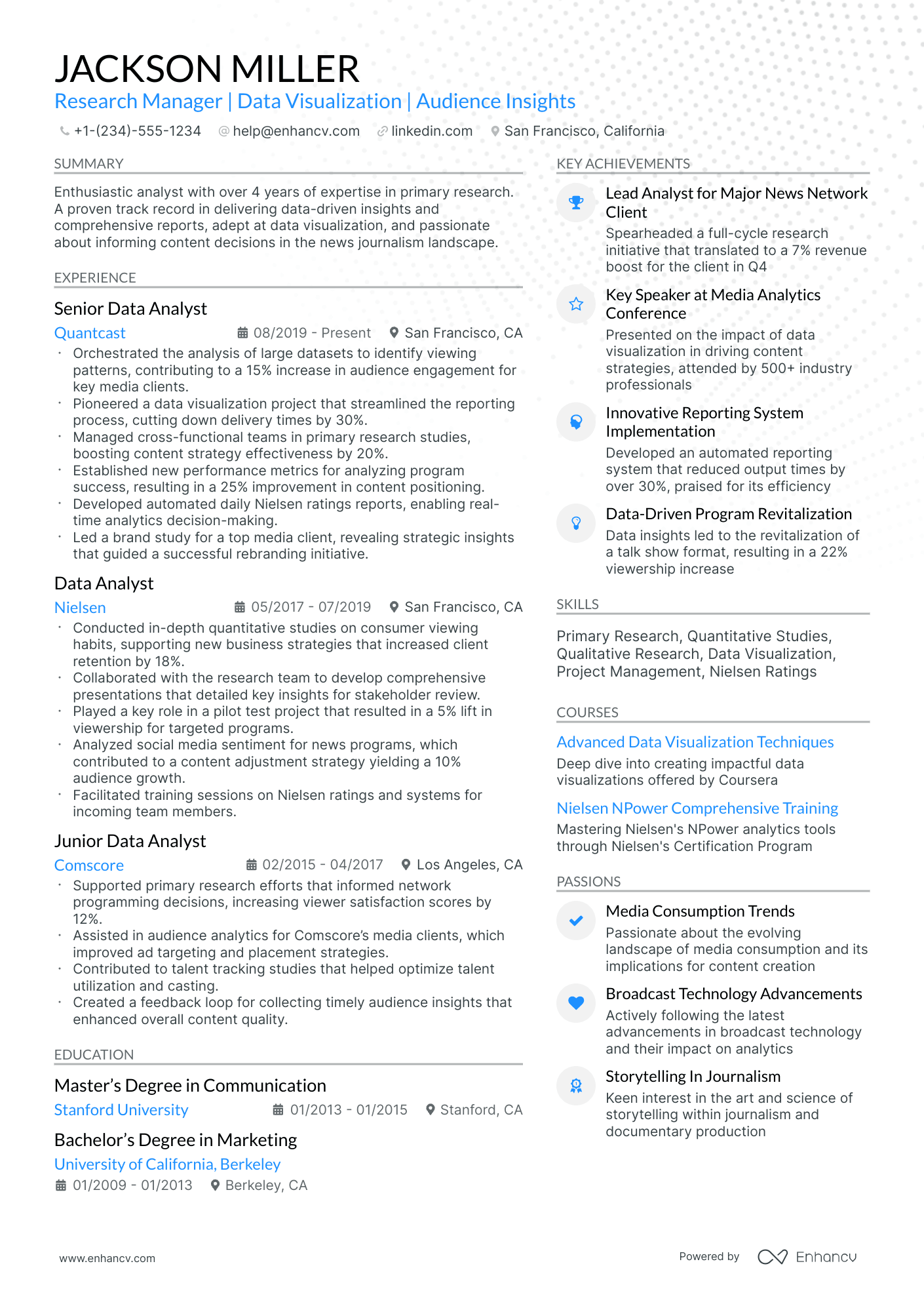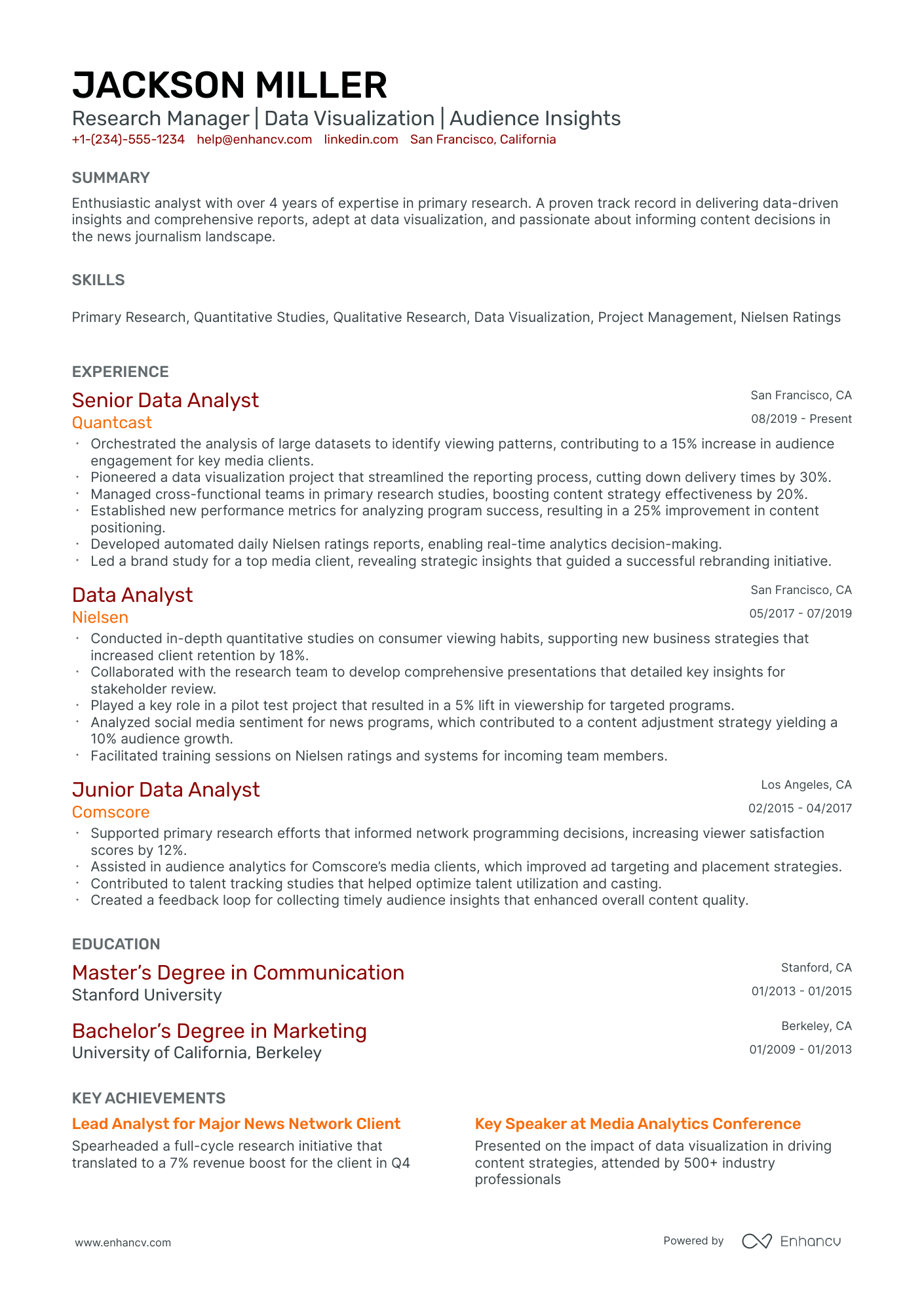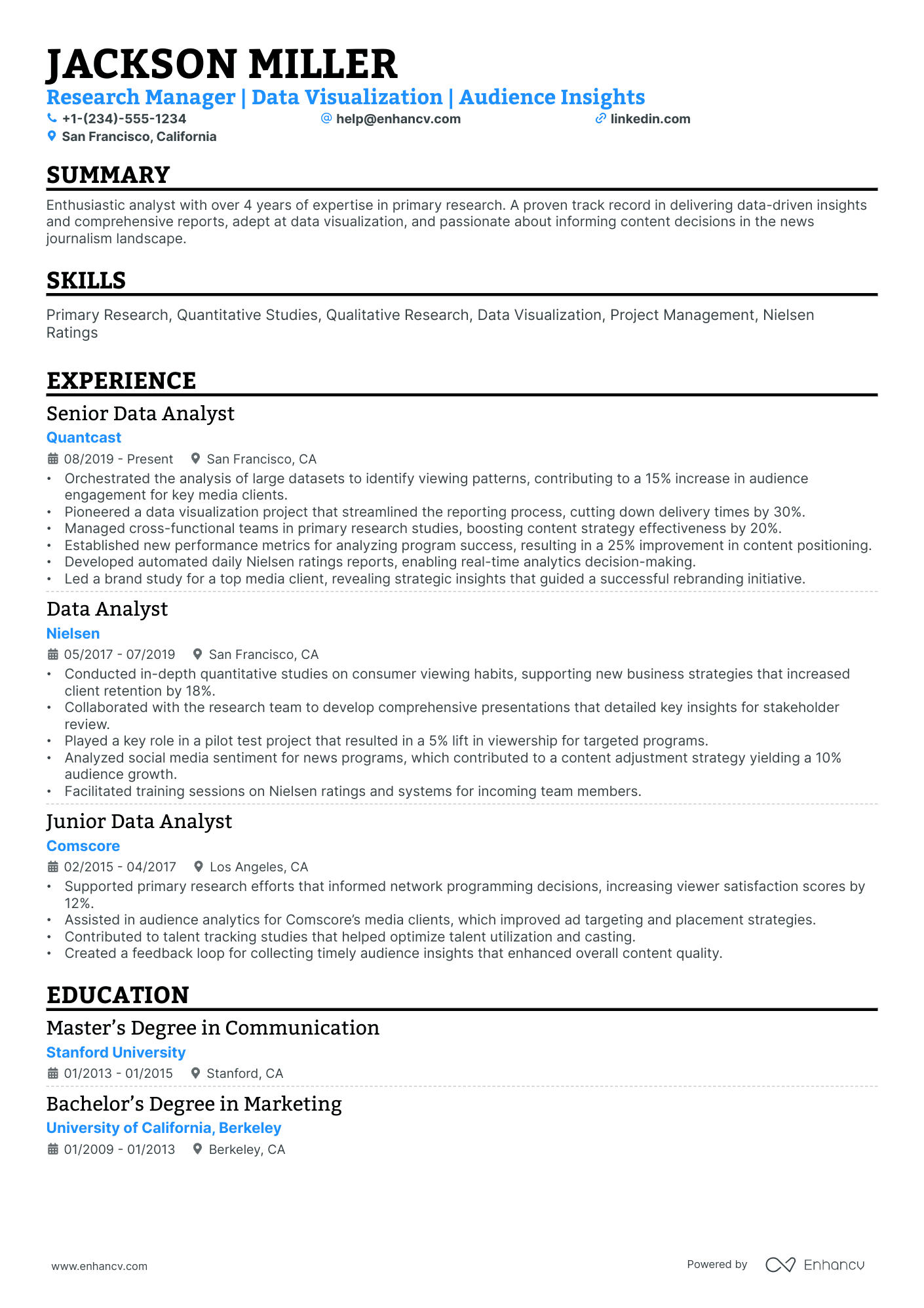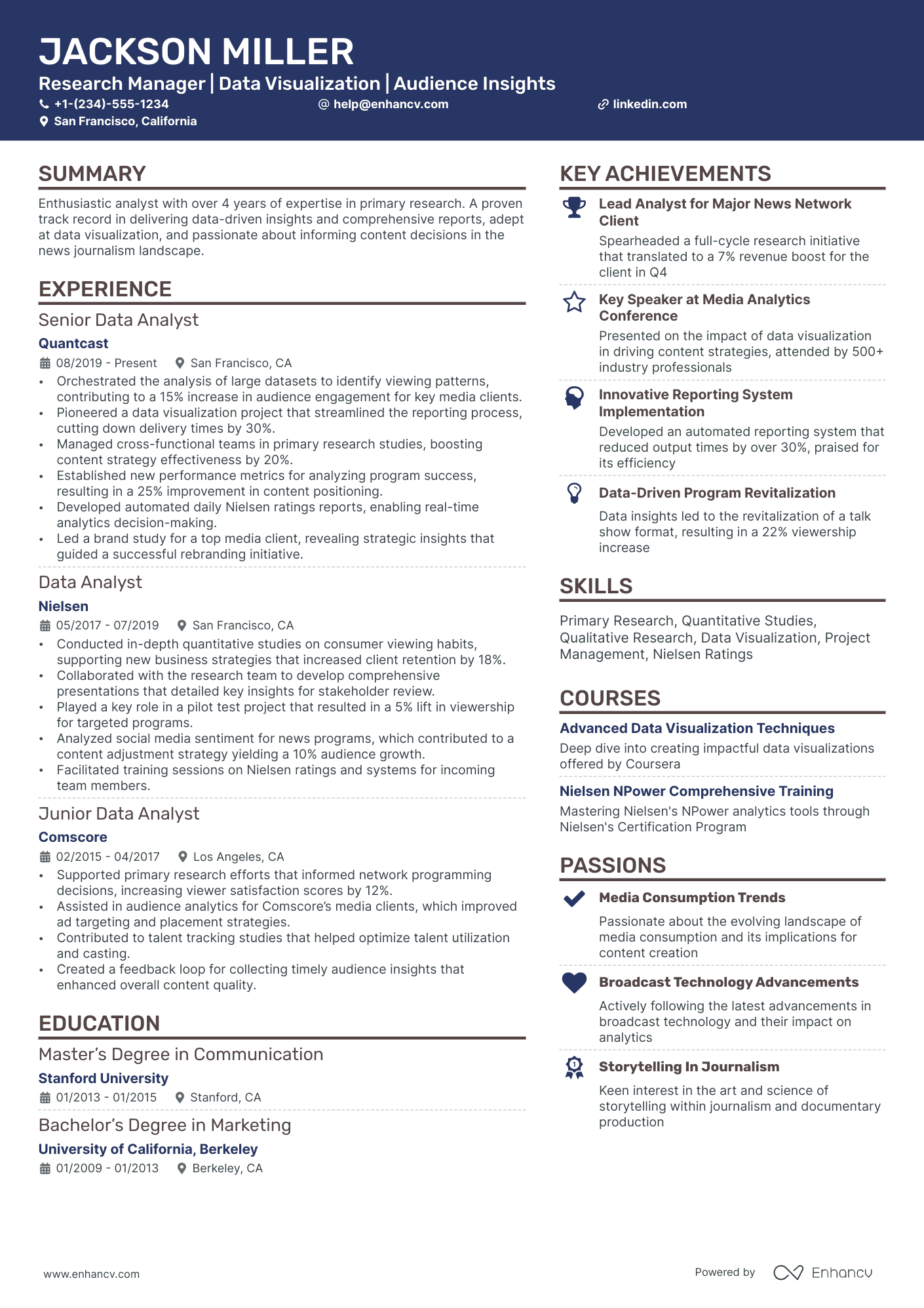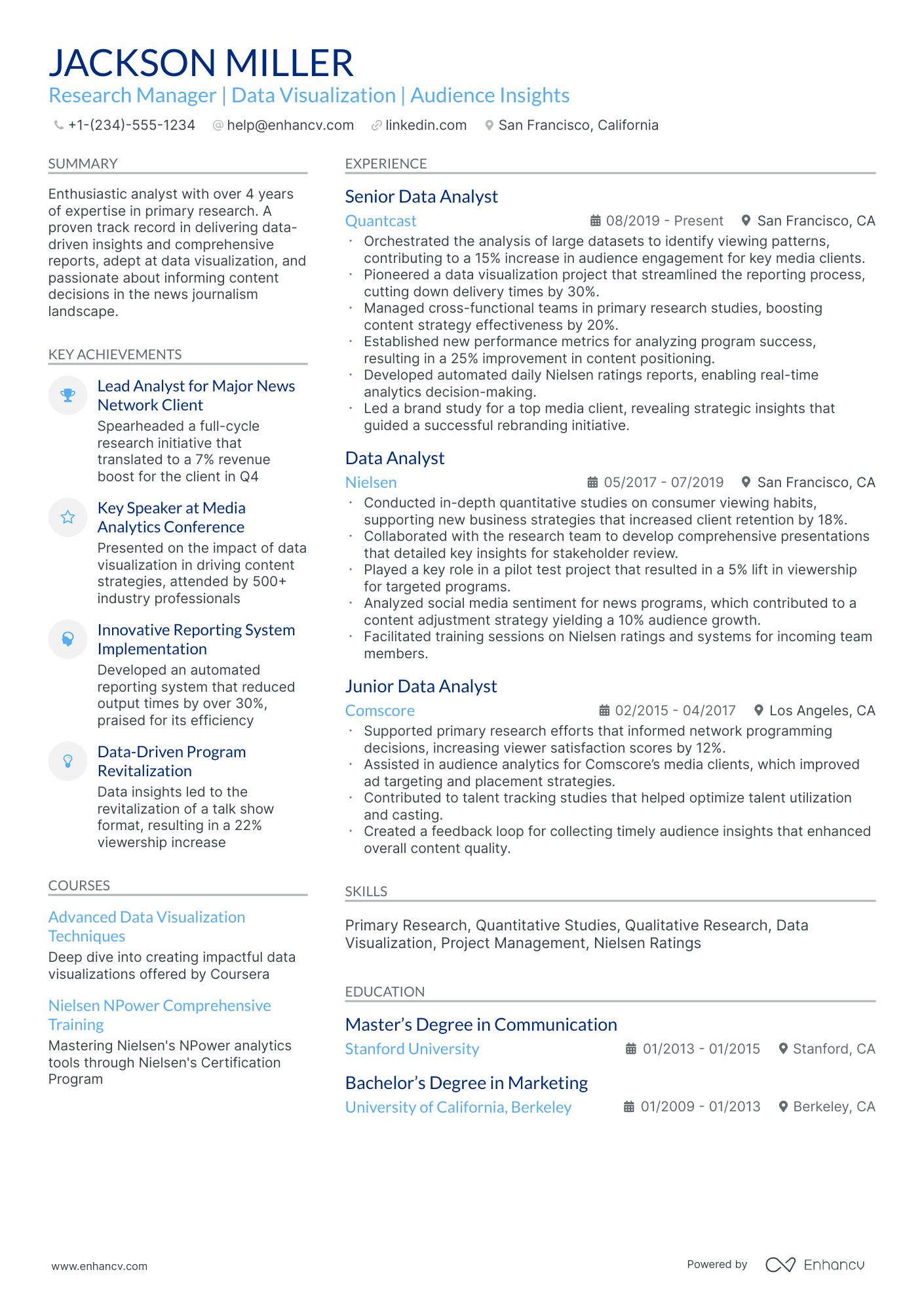Research manager resumes often fail because they read like project logs, not decision documents. In ATS filters and fast recruiter scans, a research manager resume that buries impact behind tools and tasks gets overlooked in a crowded field.
A strong resume shows how you drove decisions and reduced risk. Knowing how to make your resume stand out starts with highlighting measurable impact: revenue influenced, adoption lifted, time-to-decision shortened, studies delivered on schedule, confidence improved, and insights translated into product changes.
Key takeaways
- Use a reverse-chronological format to show a clear trajectory of growing research leadership.
- Quantify achievements with metrics like cycle time, adoption rates, cost savings, and risk reduction.
- Tailor every experience bullet to mirror the job posting's tools, methods, and KPIs.
- Demonstrate skills in context through your summary and experience, not just a standalone list.
- Lead each bullet with ownership scope, execution approach, and measurable business impact delivered.
- Pair your resume with a cover letter when your fit needs additional context or explanation.
- Build and refine your resume faster with Enhancv to keep each section focused and recruiter-ready.
Job market snapshot for research managers
We analyzed 193 recent research manager job ads across major US job boards. These numbers help you understand employer expectations, industry demand, experience requirements at a glance.
What level of experience employers are looking for research managers
| Years of Experience | Percentage found in job ads |
|---|---|
| 1–2 years | 2.1% (4) |
| 3–4 years | 3.1% (6) |
| 5–6 years | 22.3% (43) |
| 7–8 years | 5.2% (10) |
| 9–10 years | 5.7% (11) |
| 10+ years | 4.7% (9) |
| Not specified | 61.7% (119) |
Research manager ads by area of specialization (industry)
| Industry (Area) | Percentage found in job ads |
|---|---|
| Retail & E-commerce | 44.6% (86) |
| Healthcare | 27.5% (53) |
| Finance & Banking | 14.0% (27) |
| Education | 11.4% (22) |
Top companies hiring research managers
| Company | Percentage found in job ads |
|---|---|
| Deloitte | 28.5% (55) |
| Ipsos | 14.0% (27) |
| Savills plc | 13.5% (26) |
| Google LLC | 6.2% (12) |
Role overview stats
These tables show the most common responsibilities and employment types for research manager roles. Use them to align your resume with what employers expect and to understand how the role is structured across the market.
Day-to-day activities and top responsibilities for a research manager
| Responsibility | Percentage found in job ads |
|---|---|
| Project management | 41.5% (80) |
| Data analysis | 38.9% (75) |
| Survey design | 25.4% (49) |
| Case study development | 23.8% (46) |
| Research | 23.8% (46) |
| Microsoft office | 20.2% (39) |
| Tableau | 16.1% (31) |
| Presentation skills | 15.5% (30) |
| Adobe creative suite | 14.0% (27) |
| Spss | 14.0% (27) |
| Alteryx | 13.5% (26) |
| Costar | 13.5% (26) |
Type of employment (remote vs on-site vs hybrid)
| Employment type | Percentage found in job ads |
|---|---|
| On-site | 67.4% (130) |
| Hybrid | 25.4% (49) |
| Remote | 7.3% (14) |
How to format a research manager resume
Recruiters evaluating research manager candidates prioritize evidence of leadership scope, cross-functional coordination, and the ability to translate research outputs into strategic business decisions. A reverse-chronological format surfaces these signals immediately by presenting a clear trajectory of increasing responsibility, making it the strongest choice for this role.
I have significant experience in this role—which format should I use?
Use a reverse-chronological format—it's the only structure that clearly communicates your progression into research leadership and the expanding scope of your decision-making authority. Do:
- Lead with your most senior role and define the scope of each position: team size, budget ownership, cross-departmental influence, and stakeholder reporting lines.
- Highlight domain expertise and tools central to research management, such as research design frameworks, statistical platforms (SPSS, R, Python), IRB compliance, or market research suites like Qualtrics and Tableau.
- Quantify outcomes tied to business impact—cost savings from optimized research processes, revenue influenced by research-driven product decisions, or time-to-insight improvements.
Why hybrid and functional resumes don't work for senior roles
Hybrid formats fragment your leadership narrative by pulling key competencies out of their operational context, making it harder for reviewers to assess how your accountability and decision ownership grew over time. Functional formats are even more problematic—they obscure career progression entirely, strip away the timeline of leadership scope, and reduce quantifiable impact to disconnected skill claims that lack credibility at the management level. Avoid both formats entirely if you have three or more years of research management experience, as they'll weaken your candidacy against competitors who present a clear, linear record of advancement. Choosing the right resume layout ensures your progression and leadership scope are immediately visible to hiring teams.
- A functional format may be acceptable only if you're transitioning into research management from a senior individual contributor research role, have a significant employment gap, or are consolidating experience from contract or consulting engagements—but even then, every listed skill must be anchored to a specific project, team outcome, or measurable result.
Once you've established a clean, readable format, the next step is deciding which sections to include and how to organize them for maximum impact.
What sections should go on a research manager resume
Recruiters expect a complete, easy-to-scan resume that shows you can lead research programs and deliver measurable outcomes. Understanding which resume sections to include helps you present your qualifications with maximum clarity.
Use this structure for maximum clarity:
- Header
- Summary
- Experience
- Skills
- Projects
- Education
- Certifications
- Optional sections: Publications, Awards, Leadership
Your experience bullets should emphasize research impact, decision outcomes, program scope, stakeholder alignment, and measurable results.
Is your resume good enough?
Drop your resume here or choose a file. PDF & DOCX only. Max 2MB file size.
Once you’ve organized the key resume components, the next step is to write your research manager resume experience so it aligns with those elements and supports your overall application.
How to write your research manager resume experience
The experience section is where you prove you can lead research initiatives from design through delivery, using role-relevant methodologies, analytical tools, and stakeholder management to produce actionable insights. Hiring managers prioritize demonstrated impact—studies that shaped strategy, improved decision-making, or drove measurable business outcomes—over descriptive task lists.
Each entry should include:
- Job title
- Company and location (or remote)
- Dates of employment (month and year)
Three to five concise bullet points showing what you owned, how you executed, and what outcomes you delivered:
- Ownership scope: the research programs, portfolios, teams, methodologies, or knowledge systems you were directly accountable for as a research manager.
- Execution approach: the qualitative and quantitative research methods, analytical frameworks, data platforms, or synthesis techniques you used to generate insights and guide strategic decisions.
- Value improved: changes to research quality, insight turnaround time, data reliability, methodological rigor, participant accessibility, or organizational risk that resulted from your leadership.
- Collaboration context: how you partnered with product, engineering, marketing, clinical, academic, or executive stakeholders to align research priorities with broader organizational goals.
- Impact delivered: outcomes expressed through research-driven strategy shifts, product pivots, policy changes, funding secured, or business decisions influenced—framed as results rather than activities.
Experience bullet formula
A research manager experience example
✅ Right example - modern, quantified, specific.
Research Manager, Product Insights
AtlasPay | Remote
2021–Present
B2B payments platform serving 120,000 small businesses across the US, processing $8B+ in annual volume.
- Led a team of six researchers to deliver 45+ mixed-method studies annually using Qualtrics, UserTesting, Dovetail, and Lookback; cut median study cycle time from 21 to 14 days (33%) while maintaining a 95% stakeholder satisfaction score.
- Built a continuous discovery program with Amplitude, FullStory, and Snowflake to triangulate survey, interview, and behavioral data; reduced checkout drop-off by 12% through prioritized fixes shipped with product managers and engineers.
- Standardized research operations in Jira and Confluence, including intake, consent, templates, and a centralized repository; reduced duplicate research requests by 28% and improved reuse of findings across four product squads.
- Partnered with design and data science to run conjoint analysis and segmentation in R and Tableau; informed pricing and packaging changes that increased paid conversion by 6% and lifted annual recurring revenue by $1.4M.
- Established privacy and compliance controls with legal and security teams, including data retention and participant management in User Interviews; reduced consent-related risk findings by 40% in internal audits.
Now that you've seen how a strong experience section comes together, let's look at how to adjust yours to match the specific role you're targeting.
How to tailor your research manager resume experience
Recruiters evaluate your research manager resume through both applicant tracking systems and human review, so alignment with the job posting matters. Tailoring your resume to the job description ensures the most relevant qualifications surface immediately.
Ways to tailor your research manager experience:
- Match specific research tools and software platforms named in the posting.
- Mirror the exact methodology terms like mixed methods or longitudinal design.
- Reflect KPIs or success criteria the employer uses to measure outcomes.
- Include domain expertise in the industry the organization operates within.
- Highlight compliance and ethical review processes if the role requires them.
- Use the same language for cross-functional collaboration or team structures referenced.
- Emphasize grant writing or funding acquisition when the posting mentions it.
- Align your data governance and quality assurance experience with stated priorities.
Tailoring means framing your real accomplishments in language that directly reflects the job requirements, not forcing in keywords where they don't belong.
Resume tailoring examples for research manager
| Job description excerpt | Untailored | Tailored |
|---|---|---|
| "Lead cross-functional research initiatives using mixed-methods approaches (surveys, focus groups, ethnographic studies) to inform product strategy across multiple business units." | Managed research projects and worked with different teams to support company goals. | Led cross-functional mixed-methods research initiatives—including surveys, focus groups, and ethnographic studies—across four business units, delivering insights that directly shaped a product strategy responsible for 30% revenue growth. |
| "Oversee a team of 8–10 research analysts, ensuring rigorous application of quantitative frameworks (regression analysis, conjoint analysis) and timely delivery of actionable reports to senior leadership." | Supervised a team of researchers and delivered reports to stakeholders on time. | Managed a team of nine research analysts, enforcing rigorous quantitative frameworks including regression and conjoint analysis, and delivered actionable monthly reports to senior leadership that reduced decision-cycle time by 25%. |
| "Design and manage longitudinal tracking studies using Qualtrics and SPSS to measure brand health, customer satisfaction, and competitive positioning in the healthcare sector." | Conducted tracking studies and analyzed data to monitor brand performance. | Designed and managed longitudinal brand health and customer satisfaction tracking studies in the healthcare sector using Qualtrics for fielding and SPSS for analysis, improving competitive positioning accuracy by 18% over two annual cycles. |
Once you’ve aligned your experience with the role’s priorities, quantify your research manager achievements to show the measurable impact of that work.
How to quantify your research manager achievements
Quantifying your achievements proves you drove decisions, not just delivered reports. For research managers, focus on cycle time, study quality, adoption of insights, risk reduction, and cost efficiency across programs and stakeholders.
Quantifying examples for research manager
| Metric | Example |
|---|---|
| Cycle time | "Cut study turnaround from fourteen to nine days by standardizing templates in Confluence and automating recruiting via User Interviews across six product teams." |
| Research quality | "Raised insight acceptance from 62% to 84% by adding a QA checklist, peer review, and Dovetail tagging standards across 120 studies." |
| Stakeholder adoption | "Increased roadmap decisions backed by research from 45% to 70% by launching a monthly insights review and a searchable repository in Dovetail." |
| Risk reduction | "Reduced compliance-related study issues by 60% by implementing consent workflows, data retention rules, and legal review in Jira for all moderated sessions." |
| Cost efficiency | "Lowered annual vendor spend by $180,000 by consolidating panel providers, renegotiating contracts, and shifting twenty studies to in-house recruiting." |
Turn vague job duties into measurable, recruiter-ready resume bullets in seconds with Enhancv's Bullet Point Generator.
Once you've crafted strong bullet points that showcase your accomplishments, the next step is ensuring your resume highlights the right mix of hard and soft skills that hiring managers expect from a research manager.
How to list your hard and soft skills on a research manager resume
Your skills section shows recruiters and applicant tracking systems (ATS) how you lead research programs, run rigorous studies, and drive decisions, so list role-specific tools and methods alongside leadership behaviors, with a typical balance of more hard skills than soft skills. research manager roles require a blend of:
- Product strategy and discovery skills.
- Data, analytics, and experimentation skills.
- Delivery, execution, and go-to-market discipline.
- Soft skills.
Your skills section should be:
- Scannable (bullet-style grouping).
- Relevant to the job post.
- Backed by proof in experience bullets.
- Updated with current tools.
Place your skills section:
- Above experience if you're junior or switching careers.
- Below experience if you're mid/senior with strong achievements.
Hard skills
- Research roadmap planning
- Mixed-methods study design
- Survey design, Qualtrics
- Interviewing, moderation, note-taking
- Usability testing, remote labs
- A/B testing, experimentation design
- Statistical analysis, regression, ANOVA
- SQL, data extraction
- Tableau, Looker dashboards
- Dovetail, thematic analysis
- Journey mapping, personas
- GDPR and consent management
Soft skills
- Stakeholder alignment on research questions
- Translating insights into decisions
- Prioritizing studies by impact
- Managing research intake and scope
- Coaching and developing researchers
- Driving cross-functional buy-in
- Writing clear insight narratives
- Presenting to executives with focus
- Facilitating workshops and synthesis
- Handling conflicting feedback constructively
- Setting quality standards and review cadences
- Owning outcomes from insight to action
How to show your research manager skills in context
Skills shouldn't live only in a bulleted list on your resume. Explore examples of resume skills to see how top candidates present their competencies effectively.
They should be demonstrated in:
- Your summary (high-level professional identity)
- Your experience (proof through outcomes)
Here's what each looks like in practice.
Summary example
Research manager with 12 years in clinical research, skilled in cross-functional team leadership, IRB compliance, and REDCap data management. Directed a 15-site oncology trial portfolio, reducing protocol deviations by 34% through standardized monitoring frameworks.
- Reflects senior-level experience clearly
- Names role-relevant tools and methods
- Includes a specific measurable outcome
- Signals leadership and collaboration skills
Experience example
Senior Research Manager
Meridian Health Sciences | Remote
June 2019–Present
- Led a 22-person cross-functional team across eight clinical trial sites, improving enrollment timelines by 28% using adaptive recruitment strategies in REDCap.
- Partnered with biostatistics and regulatory affairs teams to redesign data quality protocols, cutting query resolution time by 41%.
- Implemented CDISC-compliant data standards across all active studies, reducing FDA submission preparation cycles from nine weeks to five.
- Every bullet includes measurable proof
- Skills appear naturally through real outcomes
Once you’ve demonstrated your research manager strengths through results and examples, the next step is learning how to write a research manager resume with no experience so you can present those same capabilities effectively.
How do I write a research manager resume with no experience
Even without full-time experience, you can demonstrate readiness through research projects and academic work. Our guide on writing a resume without work experience covers strategies that apply directly to aspiring research managers.
- Graduate thesis with primary research
- Capstone managing cross-functional study
- Research assistantship leading study operations
- Internship coordinating user research
- Volunteer program evaluation for nonprofit
- Published conference poster or paper
- Independent survey study with analysis
- Lab leadership managing protocols and data
Focus on:
- Study design and execution evidence
- Tools: Qualtrics, SPSS, R
- Stakeholder reporting and dashboards
- Compliance: ethics, consent, privacy
Resume format tip for entry-level research manager
Use a hybrid resume format because it highlights research projects and methods while still showing relevant roles, internships, and assistantships. Do:
- Lead with a "Projects" section.
- Add tools and methods to bullets.
- Quantify samples, timelines, and impact.
- Include compliance steps and approvals.
- Tailor keywords to each posting.
- Managed capstone study in Qualtrics and R, coordinating four researchers and analyzing 312 responses; delivered dashboard and cut survey drop-off by 18%.
Even without direct experience, your educational background can serve as a strong foundation for your research manager resume—so presenting it effectively matters.
How to list your education on a research manager resume
Your education section helps hiring teams confirm you have the foundational knowledge needed. It validates your academic training in research methodologies, data analysis, and strategic thinking.
Include:
- Degree name
- Institution
- Location
- Graduation year
- Relevant coursework (for juniors or entry-level candidates)
- Honors & GPA (if 3.5 or higher)
Avoid listing specific months or days. Use the graduation year only for a cleaner look.
Here's a strong education entry tailored to a research manager resume.
Example education entry
Master of Science in Applied Research Methods
Columbia University, New York, NY
Graduated 2019
GPA: 3.8/4.0
- Relevant Coursework: Advanced Statistical Modeling, Survey Design, Qualitative Research Methods, Program Evaluation
- Honors: Dean's List, Graduated with Distinction
How to list your certifications on a research manager resume
Certifications show a research manager's commitment to learning, proficiency with key tools, and alignment with industry standards. They also validate specialized methods you use to plan, execute, and report research.
Include:
- Certificate name
- Issuing organization
- Year
- Optional: credential ID or URL
- Place certifications below education when they're older, less relevant, or secondary to your degree for the research manager role.
- Place certifications above education when they're recent, highly relevant, or required for the research manager role you target.
Best certifications for your research manager resume
- Project Management Professional (PMP)
- Certified Research Administrator (CRA)
- Professional Researcher Certification (PRC)
- Certified Clinical Research Professional (CCRP)
- Lean Six Sigma Green Belt
- Certified Data Management Professional (CDMP)
- Certified Information Privacy Professional/United States (CIPP/US)
Once you’ve positioned your credentials to support your qualifications, shift to writing your research manager resume summary so those strengths come through immediately.
How to write your research manager resume summary
Your resume summary is the first thing a recruiter reads, so it needs to earn attention fast. A strong opening frames you as a capable research manager who delivers measurable results.
Keep it to three to four lines, with:
- Your title and total years of research management experience.
- The domain, industry, or product type you specialize in.
- Core tools, methodologies, or technical skills you bring.
- One or two quantified achievements that prove your impact.
- Soft skills tied to real outcomes, such as cross-functional leadership or stakeholder alignment.
PRO TIP
At the manager level, emphasize team leadership, project scope, and business outcomes over individual task execution. Highlight how your decisions shaped research direction or improved organizational processes. Avoid vague descriptors like "passionate" or "results-driven." Replace them with specific accomplishments and measurable contributions.
Example summary for a research manager
Research manager with eight years of experience leading mixed-methods teams in healthcare technology. Directed a 12-person department, reducing project cycle times by 30% while increasing stakeholder satisfaction scores across three product lines.
Optimize your resume summary and objective for ATS
Drop your resume here or choose a file.
PDF & DOCX only. Max 2MB file size.
Now that your summary captures the value you bring, make sure your header presents the essential contact and professional details recruiters need to reach you.
What to include in a research manager resume header
Your resume header is the top section with your identity and contact details, and it boosts visibility, credibility, and recruiter screening for a research manager.
Essential resume header elements
- Full name
- Tailored job title and headline
- Location
- Phone number
- Professional email
- GitHub link
- Portfolio link
A LinkedIn link lets recruiters verify experience quickly and supports screening.
Don't include a photo on a research manager resume unless the role is explicitly front-facing or appearance-dependent.
Keep the header to two lines, match your job title to the posting, and use consistent links you can access without logins.
Example
Research manager resume header
Jordan Lee
Research manager | Mixed-methods research, stakeholder management, and program evaluation
Austin, TX | (512) 555-01XX | your.name@enhancv.com
github.com/yourname yourwebsite.com linkedin.com/in/yourname
Once your contact details and role identifiers are set at the top, add targeted additional sections to reinforce the qualifications your header can’t fully capture.
Additional sections for research manager resumes
Additional sections help you stand out when your core qualifications match other candidates. They highlight unique strengths that reinforce your credibility as a research manager.
- Languages
- Publications and peer-reviewed research
- Conference presentations and invited talks
- Professional affiliations and research networks
- Grants and funded projects
- Hobbies and interests
Once you've strengthened your resume with well-chosen additional sections, pairing it with a tailored cover letter can further set your application apart.
Do research manager resumes need a cover letter
A cover letter isn't required for a research manager, but it helps in competitive searches or when hiring teams expect one. If you're unsure where to start, understanding what a cover letter is and how it complements your resume can clarify when it's worth including. It can make a difference when your resume needs context or your fit isn't obvious.
Use a cover letter to add value in these situations:
- Explain role and team fit by matching your leadership style to the research manager scope, partners, and decision-making cadence.
- Highlight one or two projects with clear outcomes, including what changed, how you measured impact, and what you enabled for the team.
- Show understanding of the product, users, and business context by naming key user segments, constraints, and the decisions your research will support.
- Address career transitions or non-obvious experience by connecting past work to research manager responsibilities, such as stakeholder management and research operations.
Drop your resume here or choose a file.
PDF & DOCX only. Max 2MB file size.
Once you’ve decided whether an accompanying letter adds value to your application, you can use AI to strengthen your research manager resume faster and more consistently.
Using AI to improve your research manager resume
AI can sharpen your resume's clarity, structure, and impact. It helps reframe weak bullets and tighten language. But overuse strips authenticity fast. Once your content feels clear and role-aligned, step away from AI. For practical prompt ideas, check out our guide on ChatGPT resume writing.
Here are 10 practical prompts to strengthen specific sections of your research manager resume:
- Strengthen summary focus: "Rewrite my research manager resume summary to highlight leadership scope, methodology expertise, and measurable outcomes in under four sentences."
- Quantify experience bullets: "Add specific metrics and measurable results to each experience bullet on my research manager resume without inventing any data."
- Tighten skills relevance: "Review my research manager skills section and remove any entries that don't directly support cross-functional research leadership roles."
- Clarify project contributions: "Rewrite my research manager project descriptions to clearly define my role, the methods used, and the business impact delivered."
- Align with job posting: "Compare my research manager resume experience section against this job description and flag gaps in keyword alignment."
- Improve action verbs: "Replace weak or repetitive verbs in my research manager experience bullets with precise, leadership-oriented action verbs."
- Refine education section: "Reformat my research manager education section to emphasize relevant coursework, thesis work, and academic research leadership."
- Showcase certifications strategically: "Reorder and contextualize certifications on my research manager resume based on relevance to applied research leadership."
- Eliminate redundant phrasing: "Identify and remove filler words, redundancies, and vague phrases across all sections of my research manager resume."
- Tailor achievements contextually: "Rewrite my research manager accomplishments to connect each one directly to organizational goals or stakeholder outcomes."
Stop using AI once your resume sounds accurate, specific, and aligned with real experience. AI should never invent experience or inflate claims—if it didn't happen, it doesn't belong here.
Conclusion
A strong research manager resume highlights measurable outcomes, role-specific skills, and a clear structure. It shows how you planned studies, led teams, managed stakeholders, and turned findings into decisions.
Keep each section easy to scan, with focused bullets and results tied to metrics. This approach signals readiness for today’s hiring market and near-future expectations for research manager roles.
